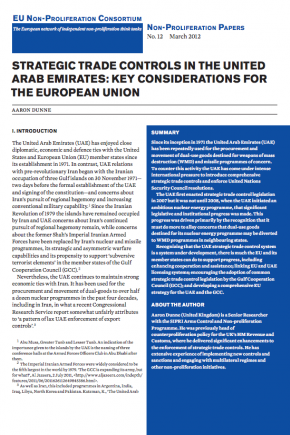Strategic Trade Controls in the United Arab Emirates: Key Considerations for the European Union
Since its inception in 1971 the United Arab Emirates (UAE) has been repeatedly used for the procurement and movement of dual-use goods destined for weapons of mass destruction (WMD) and missile programmes of concern. To counter this activity the UAE has come under intense international pressure to introduce comprehensive strategic trade controls and enforce United Nations Security Council resolutions. The UAE first enacted strategic trade control legislation in 2007 but it was not until 2008, when the UAE initiated an ambitious nuclear energy programme, that significant legislative and institutional progress was made. This progress was driven primarily by the recognition that it must do more to allay concerns that dual-use goods destined for its nuclear energy programme may be diverted to WMD programmes in neighbouring states. Recognizing that the UAE strategic trade control system is a system under development, there is much the EU and its member states can do to support progress, including enhancing cooperation and assistance; linking EU and UAE licensing systems; encouraging the adoption of common strategic trade control legislation by the Gulf Cooperation Council (GCC); and developing a comprehensive EU strategy for the UAE and the GCC.

